北师大版高中英语必修1模块1Unit1LifestylesLesson3A教学设计
- 格式:doc
- 大小:35.50 KB
- 文档页数:2
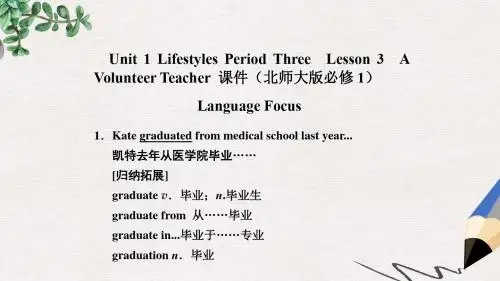
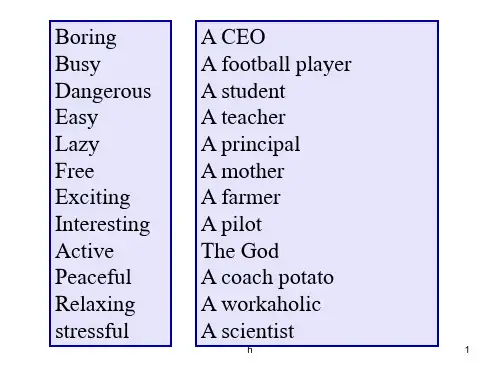
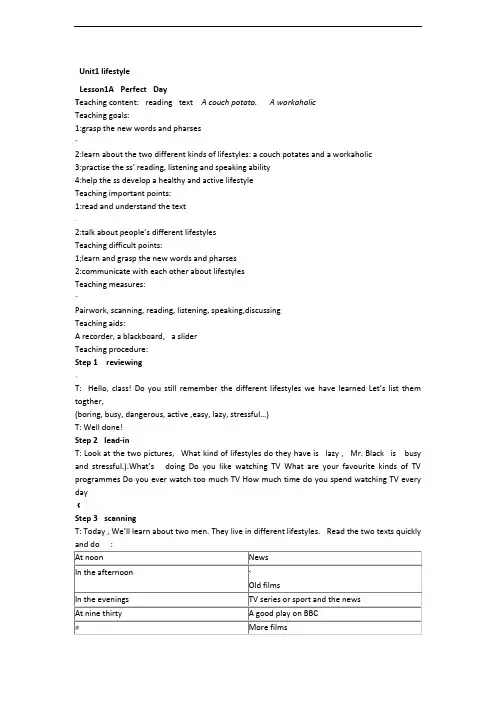
Unit1 lifestyleLesson1A Perfect DayT eaching content: reading text A couch potato. A workaholicTeaching goals:1:grasp the new words and pharses~2:learn about the two different kinds of lifestyles: a couch potates and a workaholic3:practis e the ss’ reading, listening and speaking ability4:help the ss develop a healthy and active lifestyleTeaching important points:1:read and understand the text.2:talk about people’s different lifestylesTeaching difficult points:1;learn and grasp the new words and pharses2:communicate with each other about lifestylesTeaching measures:~Pairwork, scanning, reading, listening, speaking,discussingTeaching aids:A recorder, a blackboard, a sliderTeaching procedure:Step 1 reviewing、T: Hello, clas s! Do you still remember the different lifestyles we have learned Let’s list them togther,(boring, busy, dangerous, active ,easy, lazy, stressful…)T: Well done!Step 2 lead-inT: Look at the two pictures, What kind of lifestyles do they have is lazy , Mr. Black is busy and stressful.).What’s doing Do you like watching TV What are your favourite kinds of TV programmes Do you ever watch too much TV How much time do you spend watching TV every day《Step 3 scanningT: Today , We’ll learn about two men. They live in different lifestyles. Read the two texts quickly1, have meetings and make phone calls 2:deal with rugent matters 3:do paperwork and some personal e-mails 4:read documents at home)Step 4 readingT: Quite good. Now read the text again. Underline the new words and phrases, then answer the questions in;(Suggested answers: : Brian do nothing but watch TV for 16-17hours and his wife makes money and prepares meals for him. No2: You know everything happening in the world and feel powerful and successful)Step 5 language learning1: switch on : turn onSwitch the TV on quickly, the game will be on TV soon2: switch off: turn off!Before leaving, you should switch the tap off.3:switch over: change the channels from one to another.The programme OUTLOOK is on TV. L et’s switch it over to Chaanel 9.4:be filled with; be full of5:take up: cover,occupy Playing football takes up most of his time—6:get changed; change one’s clothes7:make one’s way through:do sth.. from the beginning to the endI have been sitting , making my way through my lesson for hoursT: Let’s do complete the sentence below in the correct form . After that we’ll play the tape for you to listen and then I’ll get some ss to read the text aloud.Step 6: consolidation{T: We’ve learned Mr. Blakey and Mr. Black’s routine work. Do you think if their lifestyles are healthy What can they do to improve their lifestyles Discuss and then share your opinions with class.(For Brain he should spend less time on TV. First , he should get up soon after waking up and do morning exercises. Second ,he should try to find a job and go to work every day.. For Bob , he should sleep later every morning. He should eat a big breakfast and be more relaxed. He should also sleep earlier every night, and spend more time with his family. )T: Well, let’s go on to another topic . Ask your partner what he or she do at different time in a day, and decide wheather your partner is a couch potato or a workaholic Use the following samples: What do you do at …Step 7 homework1:Review new words and phrases《2:Do the Ex. 10 describe your parents’ lifestyles to your partner by working in pairs Blackboard DesignLesson 1 A Perfect Day1: switch on : turn on 2: switch off: turn off3:switch over: change the channels from one to another.(4:be filled with; be full of 5:take up: cover,occupy6:get changed; change one’s clothes7:make one’s way through:do sth.. from the beginning to the end.[Lesson 2 RelaxingTeaching aims:To practise listening for specific informationTo learn about ways of dealing with stress in everyday lifeTeaching course:、Ⅰ Warm upWork is very important in our life. We have to work, no matter what you are. With the development of modern society, people are fastening their steps of life. There is less time for relaxation. The problem is that more and more people feel stressed. How to get rid of the stress we are suffering from is what we are to talk about.Ⅱ TalkingTask oneYou are to do some listening, Before it think about your school life, list the things ( at least 3 ) you do and your feeling about them.~How do you get rid of the stress in your lifeTalk to each other about the activities you have listed. Say which is stressful and which is relaxing. Do it like this:prepare for an exam; lie on the beach; wait for the result of; give a talk in English; do shopping with task two.Interview your classmates to see what kind of stress they are suffering from and how they relax themselves or get rid of it.ⅢListening*Do the exercise 2Do the exercise 3Read through the Strategies with the class and see if they can use any of these Strategies already. In pairs, students read the questions and try to predict the answers. Point out that morethan one answer is possible.<Students then exchange ideas to find out if they have made the same predictions if they have made different predictions, ask students to justify their opinions.Do the exercise 5 and 6Before listening the materials ask students to read the questions and first predict answers then listen the tape twice.When students have checked their answers, ask them what advice they would give to Mark to help him be less nervous before exams and before going to parties.Do the exercise 7*Students look at the exercise and see if they can remember or can guess any of the missing words.Students listen to the cassette again and complete the sentences in the Function File. PronunciationDo the exercise 9In our oral language we often pause. Now listen to Mark again. Which words or sounds does he use to hesitate!Students listen to the cassette. After each sentence, pause the cassette so that students can repeat the hesitation device.Do the exercise 10Before starting their talk, students can look at the sentences they wrote in Exercise 9Students then put the exercise away and talk to their group without any notes, using as many hesitation words as possible.Ⅳ Homework:、Writ a report about you interview in class. Write about the stress you and most of your classmates are suffering from. Find the causes of the stresses and give advice on how to relax yourselves.…@!(.)'Lesson 3 A Volunteer TeacherTeaching aims:*To listen for specific factsTo give opinion about voluntary workTo talk about future arrangements and intentions, using the Present Simple, the Present Continuous and going toTeaching difficulties:To talk about future arrangements and intentions, using the Present Simple, the Present Continuous and going to¥Teaching Aids: computer and cassetteTeaching procedures:Ⅰ. SpeakingT: What does the girl doS:》T: Yes she is a volunteer teacher. T his is a real story. The girl’s name is Wang Shu, grew up in Hangzhou, Zhejiang Province. Upon graduation from the English department of Beijing Normal University, she left Beijing for Inner Mongolia working as a volunteer teacher. She is still there now. What do you know about this part of ChinaS:T: show a slide to introduce Inner Mongolia (Inner Mongolia (Nei Mongol) is the first national autonomous region established in China. It stretches along China's northern border with Mongolia and Russia and covers an oblong area of over million square kilometers, one eighth of China. Of all the Chinese provinces and autonomous regions, Inner Mongolia is the third largest after Xinjiang and Tibet.) Inner Mongolia falls behind developed areas so it needs volunteers go to work there.T: What can you say about the girl in the photoS:(Ⅱ ListeningStudents read the questions and predict the answersT: I think you must be interested in Wang Shu, now listen to the interview, you will learn more about her and answer these questions.Students listen to the tape and check their predictions.Students listen to the tape again and make sure of the answers&Students work in pairs and take turns to retell Wang Shu’s storyⅢ Voice your opinionIs it a good idea to do voluntary work What reasons do people have for doing voluntary workⅣ VocabularyDo the exercise 5.、Students work individually, thinking about the cues and what they are going to do.Students read the sentences, decide which words to use, and then complete the sentences. Translate sentences1.我们要两点半出发。
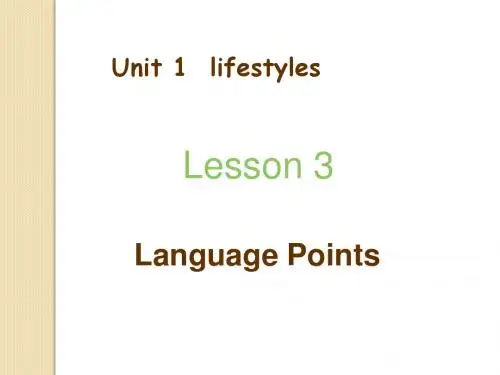
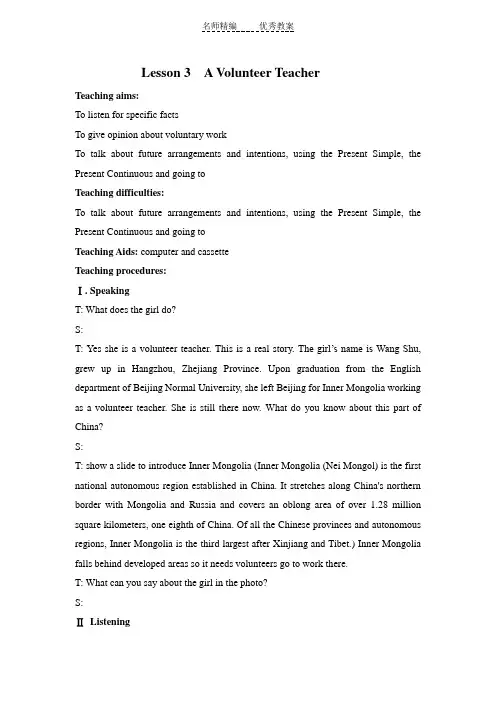
Lesson 3 A Volunteer TeacherTeaching aims:To listen for specific factsTo give opinion about voluntary workTo talk about future arrangements and intentions, using the Present Simple, the Present Continuous and going toTeaching difficulties:To talk about future arrangements and intentions, using the Present Simple, the Present Continuous and going toTeaching Aids: computer and cassetteTeaching procedures:Ⅰ. SpeakingT: What does the girl do?S:T: Yes she is a volunteer teacher. This is a real st ory. The girl’s name is Wang Shu, grew up in Hangzhou, Zhejiang Province. Upon graduation from the English department of Beijing Normal University, she left Beijing for Inner Mongolia working as a volunteer teacher. She is still there now. What do you know about this part of China?S:T: show a slide to introduce Inner Mongolia (Inner Mongolia (Nei Mongol) is the first national autonomous region established in China. It stretches along China's northern border with Mongolia and Russia and covers an oblong area of over 1.28 million square kilometers, one eighth of China. Of all the Chinese provinces and autonomous regions, Inner Mongolia is the third largest after Xinjiang and Tibet.) Inner Mongolia falls behind developed areas so it needs volunteers go to work there.T:What can you say about the girl in the photo?S:ⅡListeningStudents read the questions and predict the answersT: I think you must be interested in Wang Shu, now listen to the interview, you will learn more about her and answer these questions.Students listen to the tape and check their predictions.Students listen to the tape again and make sure of the answersStudents work in pairs and take turns to retell Wang Shu’s storyⅢVoice your opinionIs it a good idea to do voluntary work? What reasons do people have for doing voluntary work?ⅣVocabularyDo the exercise 5.Students work individually, thinking about the cues and what they are going to do. Students read the sentences, decide which words to use, and then complete the sentences.ⅤGrammarDo the exercise 6Listen to the interview again. Pay attention to these sentences from the interview. What verb forms are used to talk about the future?Guide students to draw the following conclusion:present Simplepresent Continuousgoing to + infinitivedo consolidate exercise7, 8and 9explain further grammar:Expressing future arrangements and intentions:be going to-- to express an intention to do something.Present Continuous-- to talk about future events that we have already fixed or arranged.Present Simple-- to talk about official events or timetables which we cannot change.be going to do 与be doing 的区别be going to do 表示事先经过考虑过,然后计划好将做某事;迹象将发生某事。
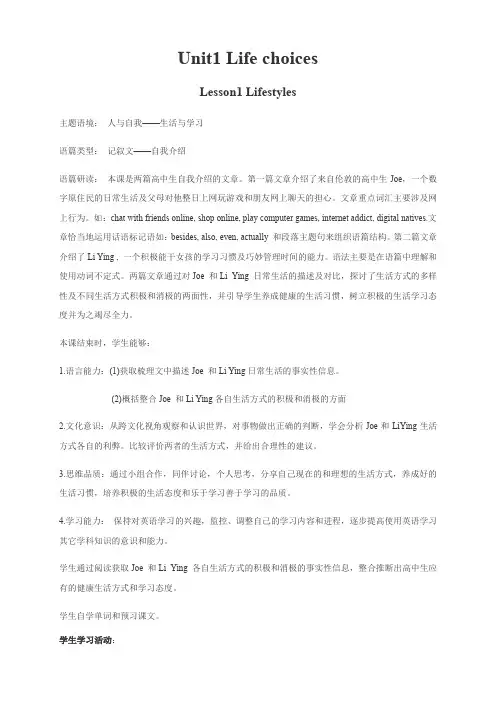
Unit1 Life choicesLesson1 Lifestyles主题语境:人与自我——生活与学习语篇类型:记叙文——自我介绍语篇研读:本课是两篇高中生自我介绍的文章。
第一篇文章介绍了来自伦敦的高中生Joe,一个数字原住民的日常生活及父母对他整日上网玩游戏和朋友网上聊天的担心。
文章重点词汇主要涉及网上行为。
如:chat with friends online, shop online, play computer games, internet addict, digital natives.文章恰当地运用话语标记语如:besides, also, even, actually 和段落主题句来组织语篇结构。
第二篇文章介绍了Li Ying , 一个积极能干女孩的学习习惯及巧妙管理时间的能力。
语法主要是在语篇中理解和使用动词不定式。
两篇文章通过对Joe 和Li Ying 日常生活的描述及对比,探讨了生活方式的多样性及不同生活方式积极和消极的两面性,并引导学生养成健康的生活习惯,树立积极的生活学习态度并为之竭尽全力。
本课结束时,学生能够:1.语言能力:(1)获取梳理文中描述Joe 和Li Ying日常生活的事实性信息。
(2)概括整合Joe 和Li Ying各自生活方式的积极和消极的方面2.文化意识:从跨文化视角观察和认识世界,对事物做出正确的判断,学会分析Joe和LiYing生活方式各自的利弊。
比较评价两者的生活方式,并给出合理性的建议。
3.思维品质:通过小组合作,同伴讨论,个人思考,分享自己现在的和理想的生活方式,养成好的生活习惯,培养积极的生活态度和乐于学习善于学习的品质。
4.学习能力:保持对英语学习的兴趣,监控、调整自己的学习内容和进程,逐步提高使用英语学习其它学科知识的意识和能力。
学生通过阅读获取Joe 和Li Ying 各自生活方式的积极和消极的事实性信息,整合推断出高中生应有的健康生活方式和学习态度。
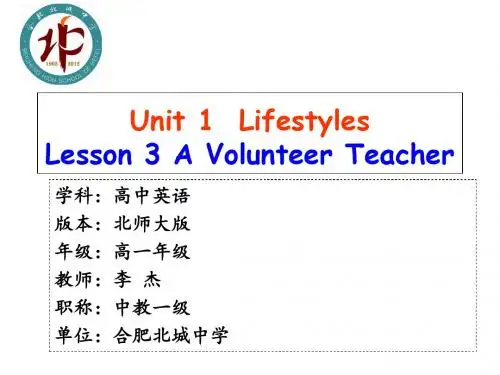
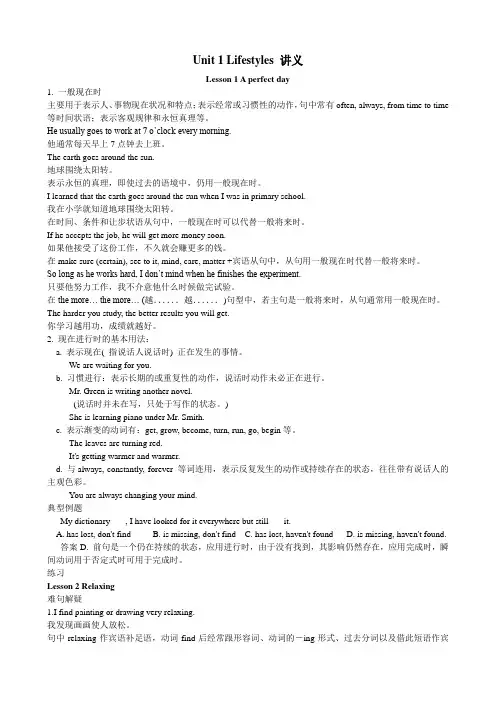
Unit 1 Lifestyles 讲义Lesson 1 A perfect day1. 一般现在时主要用于表示人、事物现在状况和特点;表示经常或习惯性的动作,句中常有often, always, from time to time 等时间状语;表示客观规律和永恒真理等。
He usually goes to work at 7 o’clock every morning.他通常每天早上7点钟去上班。
The earth goes around the sun.地球围绕太阳转。
表示永恒的真理,即使过去的语境中,仍用一般现在时。
I learned that the earth goes around the sun when I was in primary school.我在小学就知道地球围绕太阳转。
在时间、条件和让步状语从句中,一般现在时可以代替一般将来时。
If he accepts the job, he will get more money soon.如果他接受了这份工作,不久就会赚更多的钱。
在make sure (certain), see to it, mind, care, matter +宾语从句中,从句用一般现在时代替一般将来时。
So long as he works hard, I don’t mind when he finishes the experiment.只要他努力工作,我不介意他什么时候做完试验。
在the more… the more… (越......越......)句型中,若主句是一般将来时,从句通常用一般现在时。
The harder you study, the better results you will get.你学习越用功,成绩就越好。
2. 现在进行时的基本用法:a. 表示现在( 指说话人说话时) 正在发生的事情。
We are waiting for you.b. 习惯进行:表示长期的或重复性的动作,说话时动作未必正在进行。
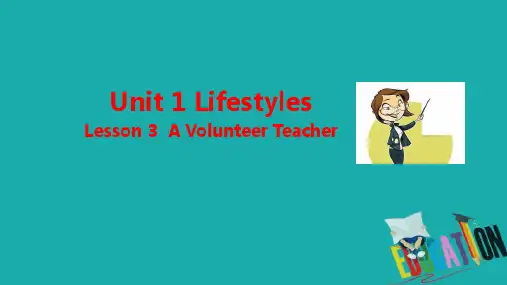
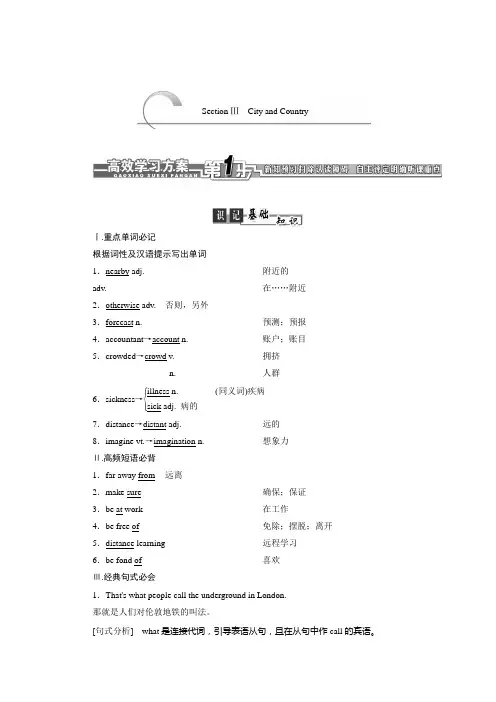
Section Ⅲ City and CountryⅠ.重点单词必记根据词性及汉语提示写出单词 1.nearby adj. 附近的 adv.在……附近2.otherwise adv. 否则,另外 3.forecast n.预测;预报 4.accountant →account n. 账户;账目 5.crowded →crowd v. 拥挤n.人群6.sickness →⎩⎪⎨⎪⎧illness n. (同义词)疾病sick adj. 病的7.distance →distant adj. 远的 8.imagine vt.→imagination n. 想象力Ⅱ.高频短语必背 1.far away from 远离 2.make sure 确保;保证 3.be at work 在工作4.be free of免除;摆脱;离开 5.distance learning 远程学习 6.be fond of喜欢Ⅲ.经典句式必会1.That's what people call the underground in London. 那就是人们对伦敦地铁的叫法。
[句式分析] what 是连接代词,引导表语从句,且在从句中作call 的宾语。
[尝试仿写]这就是我们称之为机器人(robot)的东西。
That's what_we_call_a_robot.2.Usually,it's so crowded that I can't find anywhere to sit.地铁常常那么拥挤以至于我找不到地方坐。
[句式分析]that为连词,引导结果状语从句,so ...that为固定句式,意为“如此……以至于……”。
[尝试仿写]这个小姑娘如此漂亮以至于我们都喜欢她。
The little girl is so_beautiful_that_we_all_like_her.3.I'm always tired before I arrive at work.这样每天到办公室前,我就已感到很疲倦。
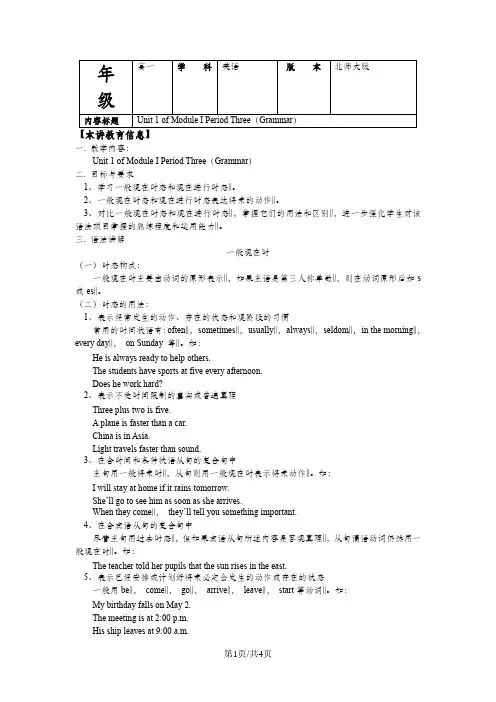
一. 教学内容:Unit 1 of Module I Period Three(Grammar)二. 目标与要求1、学习一般现在时态和现在进行时态||。
2、一般现在时态和现在进行时态表达将来的动作||。
3、对比一般现在时态和现在进行时态||,掌握它们的用法和区别||,进一步强化学生对该语法项目掌握的熟练程度和运用能力||。
三. 语法讲解一般现在时(一)时态构成:一般现在时主要由动词的原形表示||,如果主语是第三人称单数||,则在动词原形后加-s 或-es||。
(二)时态的用法:1、表示经常发生的动作、存在的状态和现阶段的习惯常用的时间状语有:often||,sometimes||,usually||,always||,seldom||,in the morning||,every day||,on Sunday 等||。
如:He is always ready to help others.The students have sports at five every afternoon.Does he work hard?2、表示不受时间限制的事实或普遍真理Three plus two is five.A plane is faster than a car.China is in Asia.Light travels faster than sound.3、在含时间和条件状语从句的复合句中主句用一般将来时||,从句则用一般现在时表示将来动作||。
如:I will stay at home if it rains tomorrow.She’ll go to see him as soon as she arrives.When they come||,they’ll tell you something important.4、在含宾语从句的复合句中尽管主句用过去时态||,但如果宾语从句所述内容是客观真理||,从句谓语动词仍然用一般现在时||。
确山二高年级学科共案时间:星期:主备人:使用人:【教学主题】Unit1 Lifestyles Lesson 3【教学目标】了解一般现在时、现在进行时与一般将来时的不同用法【知识梳理】Step2.一般现在时1.表客观真理,科学事实,格言及其它不受时间限制的客观存在。
a. The earth moves around the sun.b. A rolling stone gathers no moss(青苔).流水不腐。
2.表经常习惯性动作。
a. Father doesn’t smoke.b. He always sleeps with his windows open.3.表现在的行为或状态。
a. Someone’s at the door.b. What’s the matter with you?4.表主语所具备的特点,特征或能力。
Tom speaks good English.5.常用于时间、条件、让步状语从句,表将来,即经常说到的主将从现。
a. If it is fine tomorrow,we’ll go to the countryside.b. We’ll go out for a walk as soon as the rain stops.6.用于根据规定或时间表预计要发生的动作,只限于go,come,leave, start,stay, begin,close, open等动词。
a. The train leaves at 7∶30 this evening.b. The term starts on 23rd August.现在进行时be doing用以体现现在(或现阶段)正在发生或进行的动作1.表说话的时刻正在发生或进行的动作。
He is watching TV now.2.表目前一段时间内正在进行的动作,说话时动作未必正在进行。
Mr. Green is writing a novel these days.3.与频度副词、连词always,continually,forever,constantly,all the time等连用,带有感情色彩,多半表示说话人不满情绪、惊讶或赞赏等感情色彩。
北师大版高一英语必修一Unit( 1)Lifestyles教学案第一单元 Lifestyles【话题导入】People from All Walks of LifeWhenpeople grow up, they will take different occupations in different work places. A society is thus made up of people from different walks oflife. What kind of person do you want to be in the future? Thefollowing introductions might help you to make a right decision.TeacherTeachers are professionals who work in schools, colleges anduniversities. They try their best to help their students get new knowledge and becomeuseful people in the future. Teachers work includes explaining lessons, giving homework and correcting papers and so on. At the end ofevery term, they give grades to their students, too. Actually teachersdo more. Often their impact on students stays all through their lives.DoctorDoctors, like teachers, are also professionals. They work inhospitals. Doctors are usually very busy too. They examine patients then tell them what kind of medicine to take. The skills of a doctor sometimes mean the difference between life and death.SecretaryA secretary is a person who writes letters, answers the telephone,and receives people. She stores information in a computer and keepdocuments in order. A secretary stands between her boss and the visitors;she also helps the boss to plan his time and finishes his work. Girls are more likely to become secretaries then boys.BusinesspersonA businessman usually works in an office, where he/she also goes tomeetings and discussed problems with his/her business partners. He/Sheworks at buying, selling, and producing things, He/She usually does notwork by himself/herself, but hire workers to help him/her. People often thinka businessperson gets rich quickly, but, in fact, for every coin,they have spent a lot of time and efforts。
新课标教材北师大版必修模块1 Unit 1 Lifestyles
Lesson 3 A Volunteer Teacher
Period 1 Listening and speaking
课堂设计
设计原则本课时采取了“准确简洁、实用可学”的设计原则,侧重常态教学。
设计重点聚焦在以下两方面:学生活动的活动数量和质量;课堂的起伏和流畅。
模式新课标下的学生主体参与及合作学习
目标1. 学生能够抓住语段中的关键词,理解主旨大意。
2. 学生能够了解采访的形式及简单应用。
教学内容1.了解志愿者Wang Shu的信息。
2.介绍采访的形式,结合志愿者话题加以应用。
教学重点1. 在使用中掌握词汇和句型。
2. 主要技能训练:听说写
教学
难点
学生掌握词汇和句型并应用。
语言焦点volunteer, graduate, minus, basin, challenge, decision, support, be excited about; enjoy meeting new challenges;
I’d like to do/work as…
I feel it’s my duty to …
能力猜测、理解、归纳、应用、
教法1. 任务驱动,逐层递进
2. 集体参与,小组合作,小组展示
教学步骤。